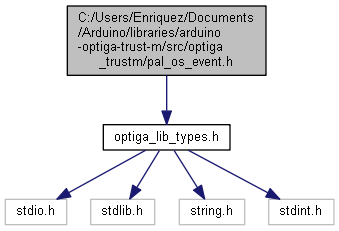This file provides the prototype declarations of PAL OS event. More...
#include "optiga_lib_types.h"

Go to the source code of this file.
Classes | |
| struct | pal_os_event |
| PAL os event structure. More... | |
| typedef void(* | register_callback) (void *) |
| typedef for Callback function when timer elapses. More... | |
| typedef struct pal_os_event | pal_os_event_t |
| PAL os event structure. More... | |
| LIBRARY_EXPORTS pal_os_event_t * | pal_os_event_create (register_callback callback, void *callback_args) |
| Create an os event. More... | |
| LIBRARY_EXPORTS void | pal_os_event_destroy (pal_os_event_t *pal_os_event) |
| Destroys an os event. More... | |
| LIBRARY_EXPORTS void | pal_os_event_register_callback_oneshot (pal_os_event_t *p_pal_os_event, register_callback callback, void *callback_args, uint32_t time_us) |
| Callback registration function to trigger once when timer expires. More... | |
| void | pal_os_event_trigger_registered_callback (void) |
| Timer callback handler. More... | |
| LIBRARY_EXPORTS void | pal_os_event_start (pal_os_event_t *p_pal_os_event, register_callback callback, void *callback_args) |
| Start an os event. More... | |
| LIBRARY_EXPORTS void | pal_os_event_stop (pal_os_event_t *p_pal_os_event) |
| Stops an os event. More... | |
| void | pal_os_event_process (void) |
This file provides the prototype declarations of PAL OS event.
Copyright (c) 2019 Infineon Technologies AG
Permission is hereby granted, free of charge, to any person obtaining a copy of this software and associated documentation files (the "Software"), to deal in the Software without restriction, including without limitation the rights to use, copy, modify, merge, publish, distribute, sublicense, and/or sell copies of the Software, and to permit persons to whom the Software is furnished to do so, subject to the following conditions:
The above copyright notice and this permission notice shall be included in all copies or substantial portions of the Software.
THE SOFTWARE IS PROVIDED "AS IS", WITHOUT WARRANTY OF ANY KIND, EXPRESS OR IMPLIED, INCLUDING BUT NOT LIMITED TO THE WARRANTIES OF MERCHANTABILITY, FITNESS FOR A PARTICULAR PURPOSE AND NONINFRINGEMENT. IN NO EVENT SHALL THE AUTHORS OR COPYRIGHT HOLDERS BE LIABLE FOR ANY CLAIM, DAMAGES OR OTHER LIABILITY, WHETHER IN AN ACTION OF CONTRACT, TORT OR OTHERWISE, ARISING FROM, OUT OF OR IN CONNECTION WITH THE SOFTWARE OR THE USE OR OTHER DEALINGS IN THE SOFTWARE
\endcopyright
| typedef struct pal_os_event pal_os_event_t |
PAL os event structure.
| typedef void( * register_callback) (void *) |
typedef for Callback function when timer elapses.
| LIBRARY_EXPORTS pal_os_event_t* pal_os_event_create | ( | register_callback | callback, |
| void * | callback_args | ||
| ) |
Create an os event.
Starts an OS event.
| [in] | callback | Callback function to be registered internally |
| [in] | callback_args | Arguement to be passed to registered callback |

| LIBRARY_EXPORTS void pal_os_event_destroy | ( | pal_os_event_t * | pal_os_event | ) |
Destroys an os event.
Starts an OS event.
| [in] | pal_os_event | pal_os_event to be destroyed |
| void pal_os_event_process | ( | void | ) |
| LIBRARY_EXPORTS void pal_os_event_register_callback_oneshot | ( | pal_os_event_t * | p_pal_os_event, |
| register_callback | callback, | ||
| void * | callback_args, | ||
| uint32_t | time_us | ||
| ) |
Callback registration function to trigger once when timer expires.
Platform specific event call back registration function to trigger once when timer expires.
| [in] | p_pal_os_event | Pointer to pal_os_event |
| [in] | callback | Callback function pointer |
| [in] | callback_args | Callback arguments |
| [in] | time_us | time in micro seconds to trigger the call back |
| LIBRARY_EXPORTS void pal_os_event_start | ( | pal_os_event_t * | p_pal_os_event, |
| register_callback | callback, | ||
| void * | callback_args | ||
| ) |
Start an os event.
Starts an OS event.
| [in] | p_pal_os_event | Pointer to os event |
| [in] | callback | Callback function to be registered internally |
| [in] | callback_args | Arguement to be passed to registered callback |

| LIBRARY_EXPORTS void pal_os_event_stop | ( | pal_os_event_t * | p_pal_os_event | ) |
Stops an os event.
Stops an OS event.
| [in] | p_pal_os_event | Pointer to os event |
| void pal_os_event_trigger_registered_callback | ( | void | ) |
Timer callback handler.
Timer callback handler.